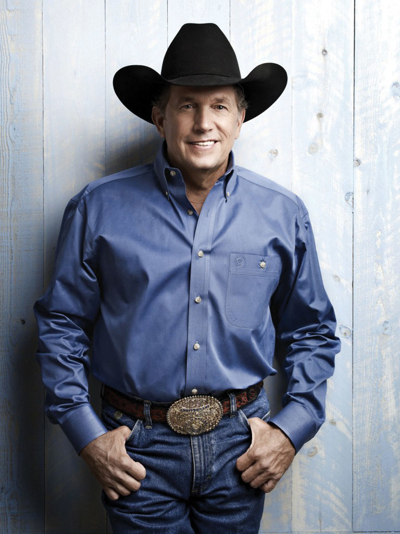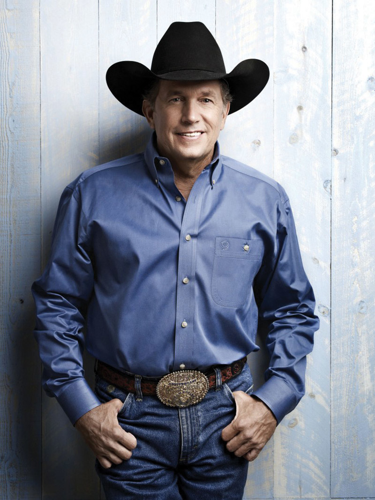Fans who have been shelling out for George Strait shed shows all these years haven't been looking for some radical departure from performances past. It's consistency they've wanted, and consistency they've gotten — up until his Cowboy Rides Away Tour, with its ever-present specter of departure. Now that Strait's retiring from the road — but not the studio; last summer he signed on to record five more all-new albums for MCA Nashville — opportunities to experience his dignified live showmanship are dwindling rapidly.
Considering it's a song about a guy extricating himself from a rocky romance, Strait's mid-'80s hit "The Cowboy Rides Away" isn't a perfect metaphor for this juncture. Still, the lyrics conjure those classic Western endings where the hero gallops into the distance, and that iconic cinematic image can help us understand Strait, the towering country superstar, and the eminently masculine musical legacy he'll leave behind.
The late, great Chet Flippo once put it this way for his CMT "Nashville Skyline" column: "[Gary Cooper's] movies may probably best explain the appeal of George Strait. ... Cooper was not the loud-talking showoff that John Wayne often played in his Westerns. Cooper was the strong, silent good-guy who was admired by the men and adored by the women. And he loved children and animals."
Here's how things go down at the end of High Noon, one of Cooper's best known vehicles: Satisfied that he's done his outlaw-exterminating duty, Cooper, as Marshal Will Kane, tosses his badge in the dust, climbs into a wagon with his wife and rolls on out of town, ostensibly toward a quieter, more private life. It's not hard to envision Strait making an equally clean and contented break at the end of this two-year farewell tour. But then, he's always maintained a neat division between public and private existence.
"Probably the reason he doesn't air out dirty laundry is there ain't a whole lot of it," says Dean Dillon, who's contributed more songs to Strait's formidable catalog than any other songwriter. "He's just a straight-ahead, solid family guy, who believes in God and loves country music. I'm not gonna blow smoke up your heinie because we're sittin' here doin' an interview and I want to put George Strait on a pedestal. That's not the reason I say what I do. From my experience, from what I know, from what I've seen out of that man, he's an honorable person."
Dillon's had three-and-a-half decades to wrap his head around Strait, dating back to the afternoon when Dillon and his writing partner Frank Dycus sat on a front porch on Music Row, swilling beers from the Budweiser truck they'd flagged down at a nearby stop sign and pondering what to do with songs like "Unwound," which they'd planned to pitch to Johnny Paycheck had he not gotten locked up.
"[Producer] Blake [Mevis] pulls up to the curb and says, 'Hey, you got any songs for this kid named George Strait?' " recalls Dillon. "I thought, 'You know what? Maybe that's a sign. So let's go that route.'
"In those days," Dillon continues, "nobody [was] gonna pitch their best stuff to some unknown guy in Texas. If you've got Johnny Cash and Dolly Parton and God knows who else sittin' there to pitch your songs to, why would you pitch to some guy from Texas? Well, me and Dycus, we were outlaws anyway. ... Blake was a good friend of ours. He was excited about George. So if he was excited, then there must be something there, I thought anyway. So I pitched him everything I had — everything and the kitchen sink."
Dillon landed six songs on Strait's 1981 debut Strait Country, and when it came time for a follow-up, the two of them inaugurated a semi-annual tradition founded on loyalty: At a standing Monday morning meeting, Dillon, a compelling performer in his own right, would sing Strait the cream of his latest compositional crop. Ask Dillon what sold Strait on his songs, and the Nashville Songwriters Hall of Famer skips right over lyrical content — the gentlemanly barroom flirtation of "The Chair," the self-conscious confessions of the ordinarily nonchalant guy in "It Ain't Cool to Be Crazy About You," the honorable attempt to let her down easy in "Easy Come, Easy Go" — and talks musical sophistication.
"When he listens to a song, he listens to the melody first," says Dillon, "and if he likes the melody, he'll go back and listen to it again. ... I mean, he's cut a lot of straight-up country music, for sure, but then again, he also cut 'Marina Del Rey,' which was a big stretch in those days melody-wise. You just can't stamp him a 'one-four-five' guy, because he's not." (One-four-five is conventional country music's default chord progression.)
On the one hand, Strait has seamlessly blended his relaxed take on Texas-style neo-traditionalism — honky-tonk and Western swing both — with his feel for singing intricate, jazz-inflected, soft rock songcraft. "Versatile," Dillon emphasizes. On the other hand, Strait's a conservative stage performer by latter-day arena show standards, stationary at his microphone and gallantly straightforward in his presentation and attire.
"Well, to George, the show is the music," says Dillon. "The show is him singin' the songs. The show is not acrobatics and lights and smoke and all that stuff. That's not who that guy is. That guy is a great country singer, man. Let me just tell ya this: Try singin' a George Strait song. ... As a singer, it's not easy to replicate what he does a lot of times."
Half a dozen years ago, Dillon started traveling to Texas for joint songwriting sessions with Strait and his rodeo-roping offspring Bubba (George Strait Jr.). One of the many collaborations between father, son and trusted Row pro that have shown up on the elder Strait's recent albums is "I'll Always Remember You."
"Everybody took that the wrong way [at the time]," says Dillon. "They took it to mean that he was gonna quit. That's not what we were trying to say at all. It was just he wanted to thank the fans that over the years had been gracious enough to come to his shows and be a part of his career."
If Strait tips his hat to the audience even more than usual as he eases toward his final exit, it's because that's just the kind of cowboy he is.
Email Music@nashvillescene.com.






